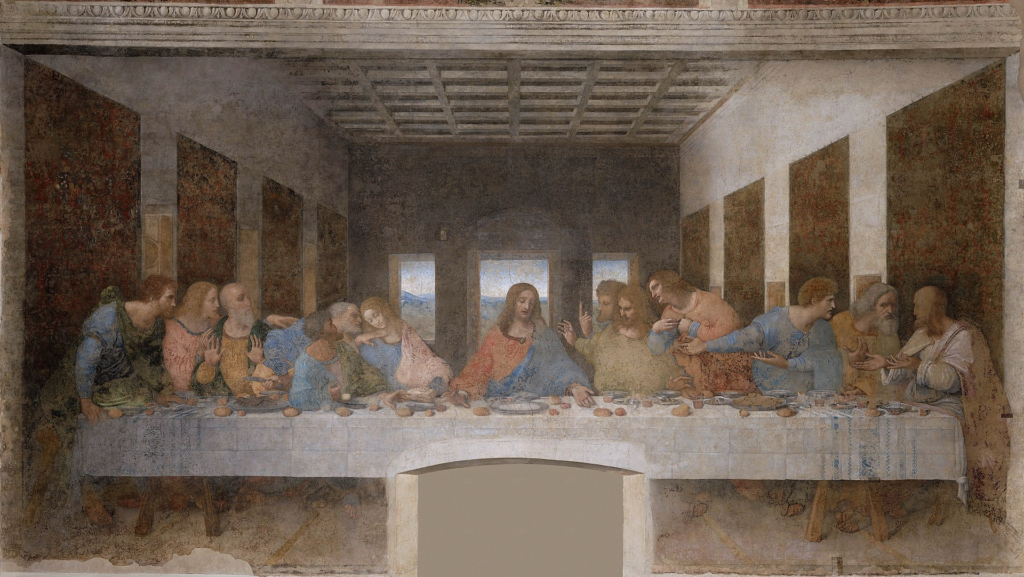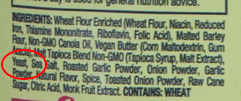Pretzels for Passover
In this post you’ll learn a little bit about Jews and a little bit about Passover and a little bit about public relations.
Start with this pitch that arrived in my email.
Show up to Passover with this Kosher snack! PS we’re on Amazon.
Hi Josh,
Passover is right around the corner, so it’s time to find some of the best Kosher snacks, to nibble on while you’re waiting for Seder to start!
Pretzels – the ultimate snacking snack. A salty crunch with a delicious flavor. It may be hard to put down that bag when you’re deep in that snacking sesh. That’s why [company name redacted] pretzels so good; you won’t feel guilty about finishing the bag.I know I don’t. They’re made with non-GMO, vegan ingredients; they’re Kosher, low in calories, and low in fat.
With 4 flavors and 2 different bag sizes (5oz or 16oz), all of [redacted]’s pretzels are the perfect healthy snack for anyone looking for a quick crunch on the go, at work, or when you’re just not in the mood to make dinner.
So, give yourself a [redacted] experience with some pretzels. We’re happy to send you a couple of samples to try for review. Let me know the best address!
Esther [not her real name]
(All the Jewish people reading this are giggling right now, or ought to be. We’ll get to you in a minute.)
I was tempted to score some free food, but something didn’t seem right . . .
OK, you gentile readers, if you know one thing about Passover, what is it?
(Murray, Schlomo, Irving, stop waving your arms, this question isn’t for you.)
Mary Margaret, yes, you. What is the one thing you know about Passover?
That Jews eat matzoh on Passover, right! Maybe you had a coworker who brought in a sandwich on matzoh and you thought, hmm, what’s with that? Or you saw all the boxes of matzoh stacked up in the Jewish food section of the market.
Why do the Jews eat matzoh on Passover, and what does that have to do with the free pretzels?
Well, it all goes back to a bible story. You probably know it. I bet even Esther (not her real name) knows it. It was a massive Cecil B. DeMille movie a few years back.

For millennia, Jews have been retelling this story — about how we were slaves in Egypt (who did you think actually hauled up those rocks and made the pyramids?) and Moses said “Let my people go,” and pharaoh wouldn’t let us go, so God rained down a bunch of terrible plagues, and then pharoah said we had to get out there in an incredible hurry, so we rushed to the Red Sea where Moses created an incredible special effect, blah, blah, blah and so on.
The Jews all know this story by heart, because we tell it on Passover at a meal and storytelling jam called a Seder. We’re not allowed to eat dinner until we finish telling the story. Instead, at specific points in the story, we we eat all these symbolic foods — haroset, which is this delicious apple-nuts-and-honey stuff that’s supposed to remind you of mortar for building pyramids, and horseradish to remind you of the bitterness of slavery, and ground up fish called gefilte fish (I love it, my wife hates it), and of course matzoh crackers.
We’ve told that story longer than you’ve told the stories about Jesus . . . in fact, Jesus’ last supper was a Passover Seder. (Which much explains why Easter and Passover are at about the same time of year.)

As everyone who ever attended a Seder recalls, the matzoh symbolizes that the Jews were rushed out of there is such a hurry that they couldn’t wait for the bread to rise.
And to help you remember all that, if you follow the rules, you’re not supposed to eat anything with leavening — yeast — for eight days starting on Passover eve. In fact, observant Jews frantically spend the last few days before Passover getting every crumb of leavened bread out of the house, which is a pretty big job. Even if, like me, you’re not orthodox, you likely know people who do this and what an effort it is. God commanded it and you take it seriously. There’s a big deal part of the Seder called The Four Questions and one of the questions is:
On all other nights we eat either leavened or unleavened bread. Why on this night do we eat only unleavened bread?
That’s not a trick question. The youngest person who can read is supposed to read it aloud, and then immediately you get to hear the answer. If you’ve been to 100 Seders, you’ve heard it 100 times.
Now let’s get to the bit about kosher. There are all sorts of rules about what you can and can’t eat if you’re an observant Jew; you’ve heard about the “no bacon, no lobster” part, I’m sure, but you may not realize you can’t eat milk and meat at the same meal. But that’s just regular, everyday kosher. It is not the same as “kosher for Passover.” Because on Passover you can’t eat anything with leavening in it. It’s right there in Question Number One of The Four Questions.
If you’re in the supermarket this weekend, go over to that big display of kosher for Passover foods and check it out. You too, Esther (not her real name). There’s the gefilte fish and the horseradish and yummy kosher for Passover snacks like these:

And there is always an assortment of all different kinds of things made of matzoh, crackers and other starches with no leavening. But there are no rolls or bread. And since pretzels are made with yeast and wheat flour, no pretzels (except weird gluten-free ones like these).
What about those pretzels? Well, I checked out the web site and while they’re made with fake non-dairy butter, they are also made with yeast, like any other pretzel. Some flavors don’t include yeast, but they do include wheat flour, which is only allowed if it’s baked into matzoh. They may be kosher, but they’re sure not kosher for Passover.

To be fair, it’s not like the snack company people are pretending to be kosher for Passover, they’re not trying to fool anyone. But Esther (not her real name) is another story.
So I pointed out to Esther (not her real name) that maybe she shouldn’t be telling Jews to come marching into Passover with a bag of yeasty pretzels that, even if they were kosher, weren’t kosher for Passover, especially after somebody probably spent days getting every crumb of bread out of the house.
It’s sort of like showing up at somebody’s one-year sobriety party with a quart of gin.
And this was the response from Esther (not her real name):
I’m Jewish. I’ll be celebrating Passover next week..hence the email I sent. Simply made a mistake that this doesn’t have matzo meal in it.
It’s still a Kosher pretzel..I’m sorry the email upset you!
Sheesh. I’m 64 years old. That’s means I’ve heard the Passover story over 100 times (there are two Seders on two successive nights, so you can visit your parents one night and your in-laws, the other), and the part about the matzoh was in there every time, highlighted right in The Four Questions. No, I’m not an observant, kosher Jew, but I know why Jews eat only matzoh on Passover.
A few observations
Now I’m hungry from talking about pretzels for so long. So some quickie thoughts here.
First, is there some list of Jewish influencers that this got sent to, and how did I get on that? Because “Show up to Passover with this Kosher snack!” sure sounds like it’s a promotional message for Jews. Who maintains the Jewish influencer list, and do they realize we’re all smartasses?
Second, if you’re using religion as a selling tool — pretty iffy, in any case — try not to violate the most basic rules about religious holidays. If your pitch mentions Passover twice, Seder once, and kosher three times, make sure you understand at a basic level what those words mean.
Third, every pitch is public. If you send it to press or influencers, it’s might as well be a tweet that everyone can read. It is, after all, public relations.
Fourth, if you hire a PR firm, keep an eye on the messages they’re sending out — because people will imagine that it comes from you.
And finally, being Jewish isn’t an excuse for forgetting any of the above. Oy.
If you know a Jew, wangle an invitation to a Seder next week — we’re actually supposed to open our homes to others at Passover. You’ll have a good time, great food, and you’ll learn a lot. Bring some hard-boiled eggs, those are traditional and pretty safe. But leave the pretzels at home, even if it says “kosher” on the bag.
Josh, this is now my favorite blog post of yours (my favorite line: “we rushed to the Red Sea where Moses created an incredible special effect”). Thank you. It is disappointing that Esther (not her real name) doesn’t know, or wouldn’t acknowledge for the sake of her PR effort, one of the basics of our religion.
PS: Passover or not, both sets of my grandparents always kept jelly candy fruit slices in their homes. And count me in on #teamgefiltefish.
#teamgefeltifish ?
Luv it!! Thanks. (•‿•)
Tom (not a Jew)
This year I am going to seders with Sephardim, so I’ve decided to follow their food customs all eight days. And pretzels are not allowed for us either! wonderful post, Josh!
Great story! Consumer Reports loves bloopers like this. I’m thinking come September “Esther” will have a recommendation for a snack to keep in your pocket during Kol Nidre.
Mazel Tov on a stellar post. Your loyal readers are kvelling. Forget the mishigas with the meshugana PRetzel nonsense. They know bupkis. The best Passover nosh? Chocolate matzah bark. Eat it in good health..
I wonder what we ought to do with mistakes. For example, the prevailing theory on the pyramids at Giza is not slaves, therefore not Jewish slaves. (and not Jews, period.)
In other news: Not a fan of religion nor selling into or out of religion.